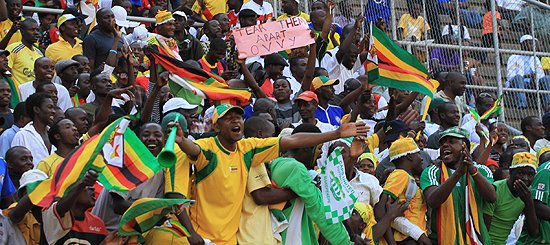The domestic Premiership is set for a landmark expansion amid revelations by ZIFA yesterday that the football mother body have initiated a broad stakeholder consultation process aimed at modernising the game’s national structures.
ZIFA short for Zimbabwe Football Association are looking at the possibility of expanding the Premier Soccer League from the current 18 to a 20-team top-flight.
The ZIFA consultative process, expected to begin in earnest, will also explore the re-aligning of the domestic season from February-November to August-May, which tallies with the bulk of the FIFA calendar.
It has emerged that the proposals are part of ZIFA’s wider agenda “to strengthen competitiveness, inclusivity, and professionalism across all tiers of the game, while ensuring that every change reflects stakeholder consensus and long-term sustainability.”
ZIFA General Secretary Yvonne Manwa revealed the association’s grand plan, which she insisted will only come into being after massive consultations with key stakeholders who also include the country’s sport regulatory body, the Sports and Recreation Commission.
“We are opening a conversation about the future of our game,” Manwa said.
“The time has come to look at our structures and ask how best we can position Zimbabwean football to meet global standards and serve our national aspirations.”
Manwa gave some insight into some of the key proposals under consideration, which if ZIFA secure a buy-in, could kick-off in the 2026 season.
The proposals to be tabled include:
The expansion of the Premier Soccer League from 18 to 20 teams. The idea is to broaden national representation, give more regions a stake in top-flight football, and stimulate local football economies.
The adjustment of the local season to align to global calendars
The creation of a national First Division’’.
Manwa added that the proposed expansion of the PSL reflects ZIFA’s commitment to inclusivity.
“We want every province to feel represented in the top league.
“Football thrives when it connects communities. This proposal invites dialogue on how we can grow the game sustainably, without compromising quality.”
Manwa also added that if adopted, the expansion would be guided by clear FIFA/CAF Club Licensing tenets, “ensuring that any new entrants meet the necessary requirements for stadium facilities, governance, and player welfare.”
The move by ZIFA to tighten the implementation of Club Licensing standards could help avoid the kind of embarrassment that relegated Kwekwe United caused to the Premiership when they struggled to fulfil fixtures and pay players well before the championship race had reached the halfway mark. ZIFA are also hopeful that a season change would help avoid clashes of the local game and the FIFA and CFA breaks for international assignments.
It will, however, not be the first time that ZIFA have dabbled with a season change.
In 1998, ZIFA approved a move initiated by the Premiership to switch to the August-May calendar.
That change, however, did not last long, owing to Zimbabwe’s well-documented challenges with proper facilities as most of the country’s stadiums are in a poor state and do not have drainage systems.
Resultantly, most matches were affected during the peak rainy season in the country.
“Another major reform proposal involves adjusting Zimbabwe’s domestic football season to align with the global FIFA calendar, which typically runs from August to May. Such alignment would bring local competitions in sync with international transfer windows, CAF tournaments, and national team schedules thereby enhancing efficiency, player welfare, and marketability.
“We are studying the benefits of synchronising with global football rhythms.
“It would help our clubs plan better for continental competitions and make it easier for players to move internationally. But this must be carefully considered in light of our local conditions and weather patterns,” Manwa said.
The ZIFA chief executive, said they are looking to gather input from clubs, players, and regional administrators be-fore finalising any transition plan.
“As part of the broader review, ZIFA is also exploring the creation of a National First Division League that would operate between the PSL and the four regional Division One leagues. The proposed structure would serve as a more cohesive second-tier competition, strengthening player pathways, improving promotion and relegation systems, and ensuring balanced national coverage.
“The pyramid of football development must rest on strong foundations,” she said.
“A National First Division would help us achieve consistency in governance, competition standards, and financial management across the country.”
Manwa also noted the need for ZIFA to review their statutes in order to meet proposals, which will be anchored on strong stakeholder engagement.
To facilitate these potential reforms, ZIFA are understood to have begun a comprehensive review of their statutes, in consultation with FIFA and the SRC.
The review will modernise the governance framework of Zimbabwean football and ensure that any new structures operate transparently and effectively.
“Our approach is consultative, not prescriptive. We are inviting ideas, questions, and perspectives from all corners of the football community — clubs, players, referees, administrators, and fans. This is about shaping the future together.”
While the proposals are still under discussion, they mark an important moment for Zimbabwean football — one that encourages fresh thinking about competitiveness, sustainability and unity.
“These are not just technical adjustments.
“They represent a mindset shift from managing football season to season to building a system that endures.
“Our ambition is to craft a football identity that is proudly Zimbabwean and globally respected.”
With FIFA having held a club professionalisation and management programme for Zimbabwe on October 9-10 in Harare, the Premiership administrators are expected to lead in the conversations around the ZIFA proposals.
The Herald

